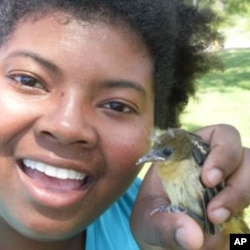Some blogs function as personal online diaries, while others provide commentary or news on a particular subject.
Scientist Danielle Lee's blogging mission is a little different. She hopes to foster an interest in science among young people in inner-city communities.
Different audience
Lee, who blogs for what she calls “the underrepresented,” believes being African-American helps her reach a different audience than most science bloggers.
“I’m really good at helping people find their on-ramp to science and I enjoy that. And I think that has to do with my personal interest in working with kind of the least-likely candidate students, because I myself was a least-likely candidate student.”
She believes African-Americans - and inner city youth in general - face many educational barriers.
“You may be encouraged to go to school, but you’re not given a lot of direction as to how to pursue particular careers, particularly in science and engineering," Lee says. "There aren’t a lot of role models. So that’s why I do my outreach, to let folks see one, a different face of science and to see different avenues into science.”
Getting started
Lee started blogging about science in 2006, while pursuing her doctorate in animal behavior at the University of Missouri-St. Louis.
In her blog, "Urban Science Adventures," Lee uses text and photographs to explain what she calls “science you can see right outside your back door,” even if you live in the city.
“I focus on urban ecology and all those different ways to access environmental science, conservation and biology," Lee says, "but through accessible, you know, wildlife watching in your neighborhood parks or backyard.”
Lee says her blog entries often grow out of conversations with friends. She recently received a text message asking her to identify an animal based on a photograph of its feces.
“And I was like, ‘Are those berries?’ And they’re like, ‘I think so.’ I said, ‘Well, take the picture again next to a ruler or something for scale.'”
After a little more investigating, she figured out the scat sample belonged to a raccoon. Lee finds being a scientist is a lot like being a detective.
“I tell people that all the time, it’s exactly what science is," says Lee. "You get to answer all your own questions, and figure things out, yeah!”
Science rap
Lee doesn’t just blog about urban ecology, she also writes another blog, called "Southern Playalistic Evolution Music."
"It's a blog about evolutionary biology, where everything is explained with rap songs," Lee says. "I call it evolutionary science remixed with phat (good) beats.”
For example, Lee says she’s used rap to explain an evolutionary concept called EPC, or extra-pair copulation.
“Extra-pair copulation is when a couple, the male or female, one or both of them might step out on their relationship for copulations outside, sometimes they have babies and sometimes they don’t, but it’s really, really common in birds.”
Lee says scientists used to think birds were monogamous. Turns out, they’re not.
“Starting in the late '80s, once we could start actually doing, you know, genetic testing, we found out that it was all types of hanky-panky going on out there. And so extra-pair copulations I thought was a really good principle to explain with Naughty By Nature's song, ‘You Down With O.P.P.’”
O.P.P. stands for “other people’s property.” The song is all about people in relationships cheating on each other, sort of like extra-pair copulation.
“And as I listened to the song I thought, ‘That’s really it.’ If you didn’t understand what EPCs were, that song is a complete and thorough explanation of O.P.P."
Lee’s outreach efforts recently got a big boost. In July, Scientific American invited her to join the magazine’s diverse network of science bloggers - opening the door for her to reach an even bigger audience.





